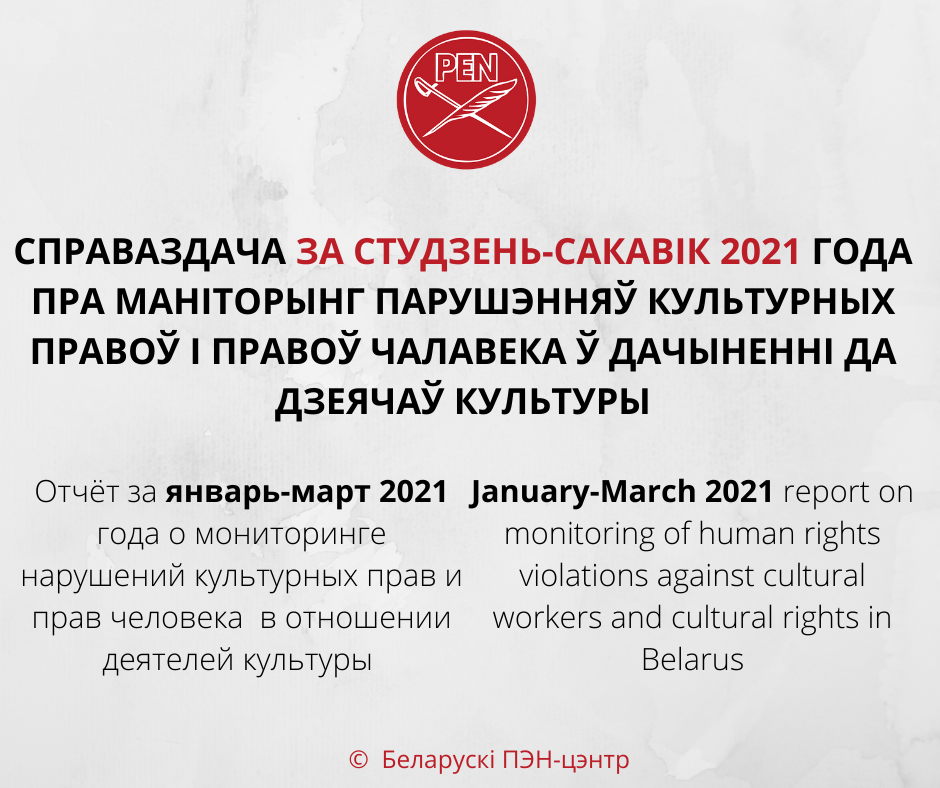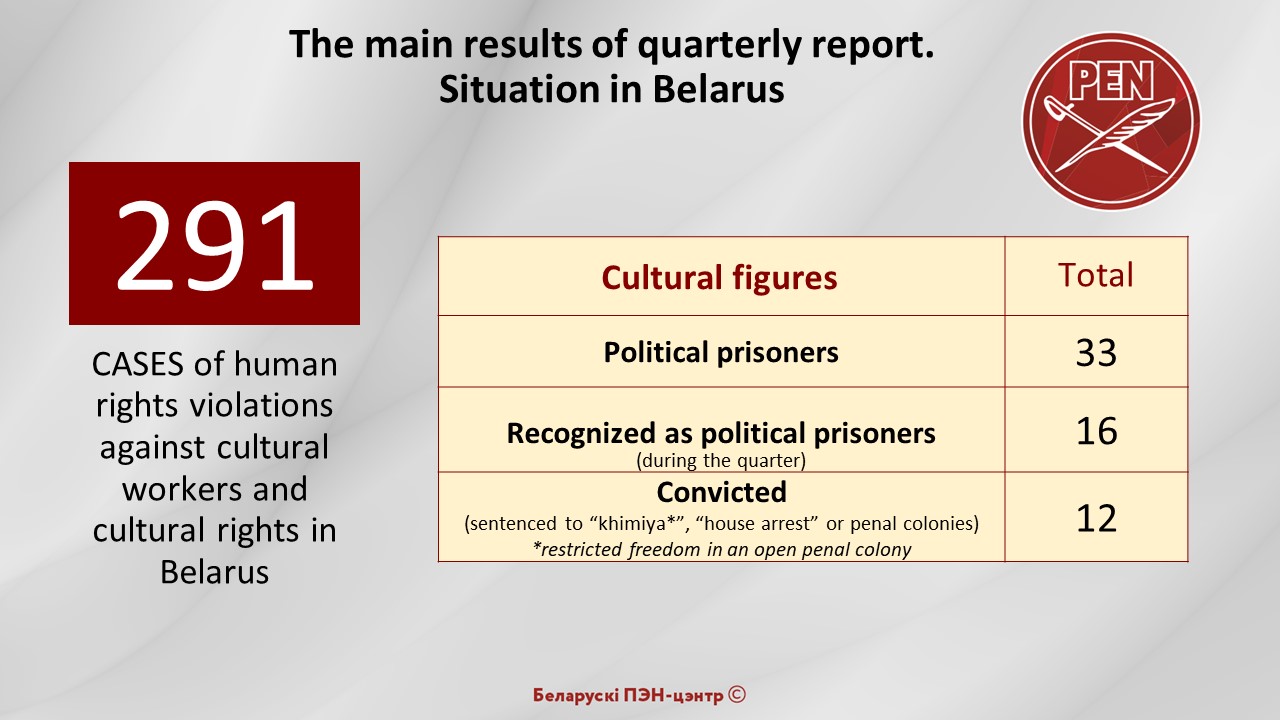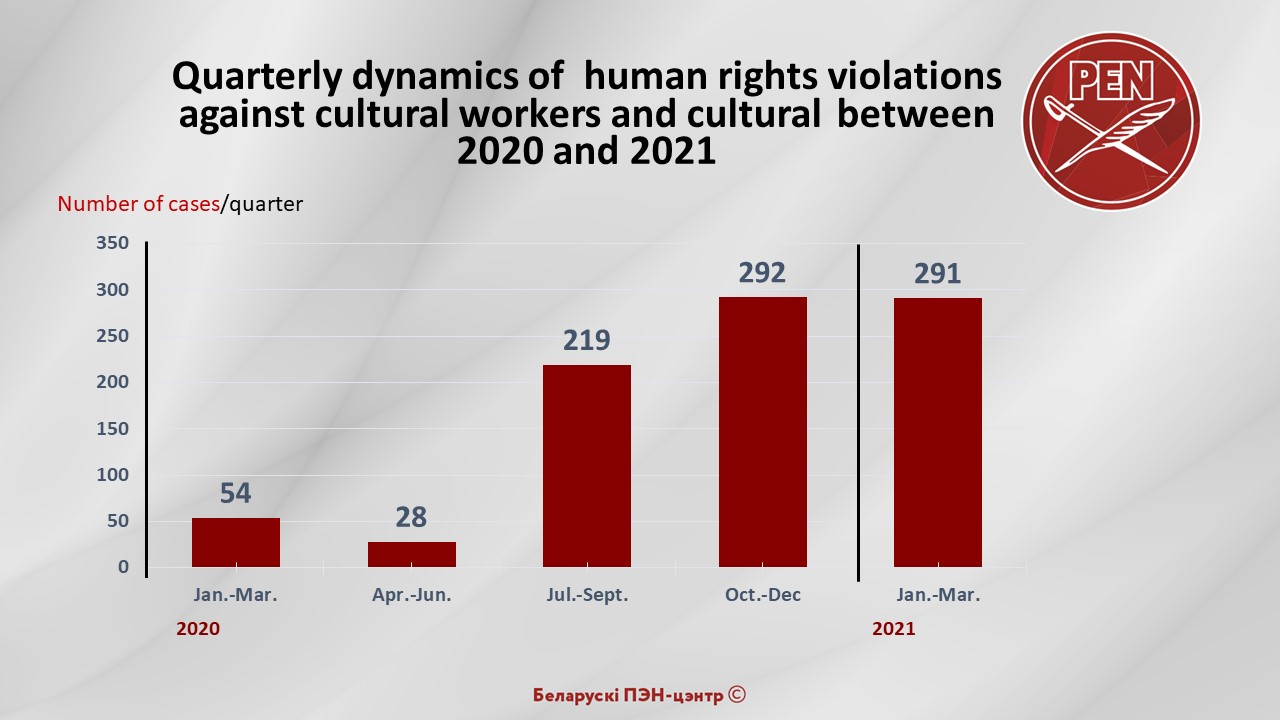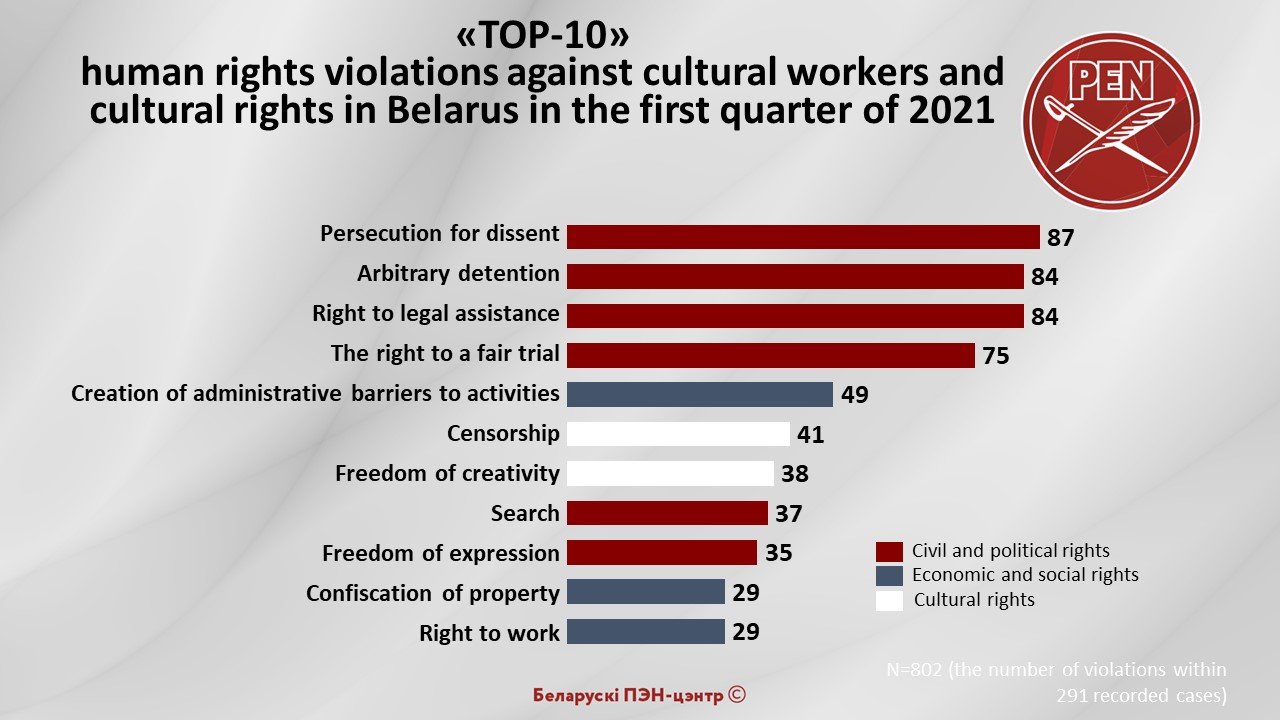
МОНИТОРИНГ НАРУШЕНИЙ ПРАВ ЧЕЛОВЕКА В СФЕРЕ КУЛЬТУРЫ НА НАЧАЛО 2021
JANUARY-MARCH 2021 REPORT ON THE MONITORING OF VIOLATIONS OF CULTURAL AND HUMAN RIGHTS AGAINST CULTURAL WORKERS
MAIN RESULTS AND TRENDS
- During the first quarter of 2021, we noted 291 cases of human and cultural rights violations. This number of cases is nearly equivalent to half of the number of cases counted in 2020. However, we counted the same number of cases (292) in the fourth quarter of 2020, when the repression machine (the main content of the monitoring) was already in full swing. Thus, it can be argued that the growth of repression and pressure, which manifested itself especially strongly starting in the 2nd half of 2020, is not weakening and is acquiring additional forms.
- As of 31.03.2021, there are 325 political prisoners in the country. 33 are cultural workers – the focus of our monitoring. Another 4 cultural figures (ex-political prisoners) have been sentenced to restraint of freedom at an open-type correctional institution (“khimiya” sentence). In total, during the first quarter, 12 people were convicted in criminal cases,sentenced to 1.5-3 years of restriction of freedom (“khimiya” or “house arrest“) or 2-8 years in a colony.


- The main trends of pressure and addressees of repression:
- Literature: publishers, publishing houses, writers.There were detentions and interrogations of publishers Hienadź Viniarski and Andrej Januškievič, book seller Aleś Jaŭdacha. The accounts of publishing houses “Januskievic Publishing House” and “Knihazbor Publishing House” were blocked. No customs clearance was allowed for Revolution by Viktar Marcinovič and Belarusian National Idea by Dzmitry Łukašuk [Dmitry Lukashuk] and Maksim Harunoŭ [Maxim Goryunov]. Several books were discredited through stories on national television. Contracts were unilaterally terminated for the sale of publications by Biełsojuzpiečat, among which there is a press with content on the topic of culture, consisting of the newspaper Novy Chas and the magazine Nasha Gistoryya. “Belarusian Donbass” by Ihar Iljaš [Ihar Ilyash] and a book by Kaciaryna Andrejeva [Katsiaryna Andreyeva] (Bahvalava) were recognized as extremist. There was a court case against journalist Raman Vasiukovič, who imported two copies of a book into the Republic of Belarus before it was declared extremist. There was a lawsuit over keeping the book “Belarusian National Idea”, which had been bought earlier in a state bookstore and seized before “signs of extremism” were found in it. And also, pensioners were detained for “participation in an unauthorized action”: reading books by Belarusian writers Nil Hilevič, Yakub Kolas, and Uladzimir Karatkievich and other classics while on a train. The question of the policeman during the interrogation sounded like this: “Why are you reading these books? This is opposition literature. “
- ArtspacesWe have recorded a trend regarding the creation of barriers to working with independent space. In early January, the owner of the premises unilaterally terminated a lease agreement with the Ok16 Cultural Hub, as a result of which all (mainly theatrical) events were canceled. Later, they came to search “Druhi Pavierch” and “Kryly Chalopa”, where documents and equipment were seized and numerous checks were carried out by the fire inspection team of the Financial Investigation Department. The Grodno bar and art-space “Third place” and the Gomel Red Pub were forced to close, and difficulties were repaired to the Minsk music club “Graffiti”. The festival of contemporary art was canceled, and the MAF art space was completely closed.
- Stores with symbolsWe have recorded the the creation of obstacles for stores that sell national symbols and clothes, including “Prince Vitaўt”, Symbal.by, “Roskvit”, “My fashionable kut”, Vokladki, BCHB.bel, “Admetnasts”, “Tsudonnaya krama”, “Chameleon”, LSTR Adzieńnie, and workshop Moj rodny kut. Some of them were forced to cease their activities in whole or in part.
- Issues of controversial memory: criminal cases on the “rehabilitation of Nazism”– The “Polish Case” unfolded massively in march following an event held to remember “outcast soldiers.” The event took place at the Polish social school of scouts named after Romuald Traugutt in Brest. As a result, the leadership of the Union of Poles (not recognized in Belarus) was detained, including Anna Panisheva, Alexander Navodnichy, Anzhelika Boris, Andrei Pochobut, Maria Tishkovskaya and Irena Bernatskaya. Authorities searched institutions in Grodno, Brest, Baranovichi, Lida, and Volkovysk.- Criminal cases were opened against Ales Pushkin (artist) and Pavel Mozheiko (head of the center) for showing a portrait of Yevgeny Zhikhar, a member of the anti-Bolshevik post-war underground, at an exhibition at the Center for Urban Life in Grodno.- “Kadish” was cancelled and the theatrical production’s actors were threatened with a criminal case against them (the productionwas also supposed to take place at the “Center for Urban Life” in Grodno; the theme of the play is the Holocaust).
- In addition, concerning cultural figures:
- the dismissals of those who disagree, who had previously taken active civic positions, and of theatre employees, continued, impacting the Mogilev Regional Drama Theater, the Grodno Regional Drama Theater, the Yanka Kupala National Academic Theater; as well as the Museum of History of Mogilev, the Novogrudok Museum of History and Local Lore, the House-Museum of Adam Mitskevich in Novogrudok, the Museum of Belarusian Polesie; as well as the Belarusian State Academy of Arts, Grodno State College of Music, Yanka Kupala State University of Grodno; and other places.
- musicians and artists were denied the ability to hold concerts and to receive touring certificates;
- arbitrary detentions, summons for interrogations, attempts to enter apartments, and arrests took place over the use of historical symbols and as a part of other cases.
Concerning cultural rights:
- The creation of obstacles affecting the right to use a cultural product was seen in the arbitrary detention of students in Belarusian language courses in Volkovysk; the escort of excursions or detention of excursionists in Polotsk, Novogrudok, and Minsk; and the arrest of concert spectators in Smolevichi.
- Enforcements of the law called “On the Protection of Historical and Cultural Heritage” targeted Belarusian language speakers and emphasized a discriminatory attitude towards the Belarusian language.

- We also wish to highlight the tendency of state media to purposefully discredit cultural figures. One hundred and twenty-three articles in the largest publication of the country were subjected to a separate analysis, and 237 defamatory/offensive statements against 89 cultural figures were recorded. More often than not, these statements defaming honor and business reputation targeted Nikolai Khalezin, Maria Kolesnikova, Yulia Chernyavskaya, Ksenia Fedorova, Vladimir Matskevich, Viktor Babariko and Natalia Kolyada.
- Numerous cases were also recorded separately, beyond the scope of this analysis:
- We tracked the authorities’ ongoing fight against symbols, particularly through the elimination of white-red-white symbols, and against actions of solidarity of the protest movement;
- We also tracked the “qualities” of management of state policy in the field of culture.
